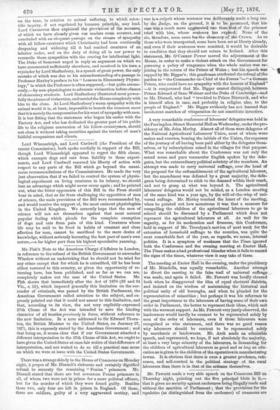Mr. Fish's Note to the American Chargé d'Affaires in London,
in reference to the refusal of the British Government to surrender Winslow without an undertaking that he should not be tried for any crime except that for which he is extradited, till he has been either restored to this country, or given the opportunity of re- turning here, has been published, and as far as we can see, completely makes out the case of the United States. Mr. Fish shows that immediately after the Act of 1870 (33 and 34 Vic., c. 52), which imposed generally this limitation on the sur- render of criminals, was passed by the British Parliament, the American Government called attention to the subject, and ex- pressly pointed out that it could not assent to this limitation, and that, according to its view, the not very explicitly-expressed 27th Clause of the Act was intended to save the binding character of all treaties previously in force, without reference to the new limitation. In a note addressed to Sir Edward Thorn- ton, the British Minister to the United States, on January 27, 1871, this is expressly stated by the American Government ; and that being so, it seems clear that if our Government attached a different interpretation to the 27th Clause of this Act, we ought to have given the United States at once fair notice of that difference of interpretation, and not waited to do so till a practical case arose on which we were at issue with the United States Government.






























 Previous page
Previous page